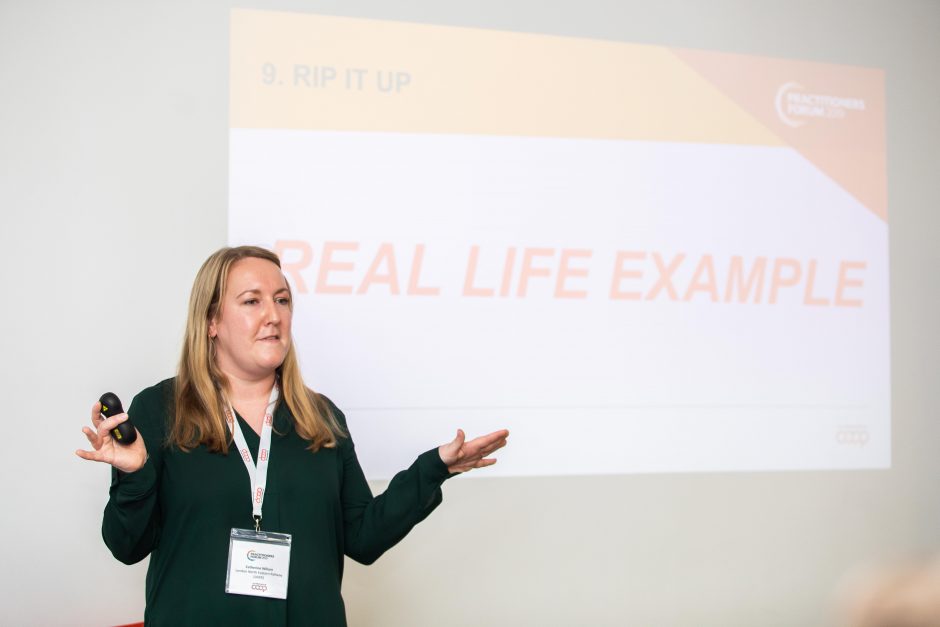Effective email marketing can help turn one-time buyers into loyal members, delegates at Co-operatives UK‘s Practitioners Forum heard. Catherine Wilson from London North Eastern Railway (LNER) shared ten of her top tips to get started with successful digital marketing.
LNER, a rail company that operates on the East Coast mainline, took over from Virgin Trains East Coast in June 2018. It pledges to ‘provide great experiences for its passengers, colleagues and communities’.
As senior customer experience and digital manager, Ms Wilson focuses on ensuring that customers have the best digital experience – including through email interactions.

Tip 10: Going back to basics
Her first tip is to go back to basics, setting ambitions and making sure that these support the business functions. She suggests starting by examining existing technology, looking at how ambitions can support the marketing strategy, and ensuring consistent voice and branding rather than having different team members working on different areas and sending different messages. Also crucial to effective email marketing are signing off messages quickly and reporting on success.
Tip 9: Rip it up and start again
Encouraging co-op practitioners to ‘think outside the box’ Ms Wilson said that if a certain approach did not work the team should challenge it. Finding creative spaces outside the office and working with new people could bring content variety, she said.
Tip 8: Nail down the purpose of your marketing
Instead of sending chunks of emails to customers, businesses should think about the purpose of their marketing and how often they should be in touch with members and customers, defining a specific approach.
Email marketing can be as innovative as businesses want it to be, said Ms Wilson, encouraging co-op practitioners to try new ideas but only after testing them first. “As long as you can measure it, do it,” she advised.
Tip 7: Get your reporting in place
Email marketing also requires setting specific key performance indicators. Ms Wilson encouraged delegates to carefully report on the success of different initiatives, from looking at how many emails were opened to how these emails had driven sales.
Tip 6: Keep lawyers happy
With the GDPR law changing the way in which businesses deal with customers’ data, enterprises are faced with reductions in the number of contactable customers. Ms Wilson suggested having a designated employee responsible for ensuring GDPR compliance as well as informing members and customers about how the data they provide is going to be used.
“Put customer first and put yourself in their shoes. Be transparent about what you’re going to do with their data,” she told delegates, asking them to examine their data retention policy.
A copy advice service is also available through the Advertising Standards Authority while legal assistance can be accessed through the the Data & Marketing Association, she added.
Related:
Tip 5: Go one-step beyond
When urgent communication is required, such as informing customers about a change, using text messages instead of emailing can be a better option. Furthermore, SMS average read rates are 98% while emails have a read rate of 20%.
Tip 4: Personalise anything and everything
Emails with personalised first name have 26% more chance of being open. Ms Wilson suggested using available data to personalise emails.
Tip 3: Automate
Making small steps towards automation can also lead to more engagement, said Ms Wilson. An example would be triggered communications. For example, if customers want to buy something, even though the product or service is not available at the time they could set an alert and receive an email when the product of service is available.
At LNER, after each journey, customers get an email to see what their journey was like. The data provided is then used to make changes. If the journey is bad, the information gets passed on to the customer service team.
When trains are delayed, LNER customers automatically receive an email informing them that they are eligible for a compensation, which gets transferred into their bank account or can be donated to charity.
Tip 2: Start the relationship on the right foot
When customers are able to choose which emails they receive, they tend to be more engaged. Media service provider Spotify adopted a similar approach to enable customers to have more power over the messages they receive.
“Personal data is valuable: what is the value exchange, what is the promise you make to those customers?” Ms Wilson asked delegates.
Tip 1: Pump up the volume
The number one tip Ms Wilson had for co-operative practitioners was to start with small changes, which can have a bigger impact, than trying to make a major change.